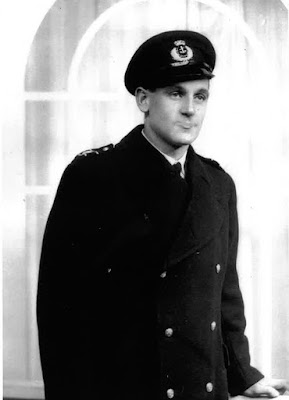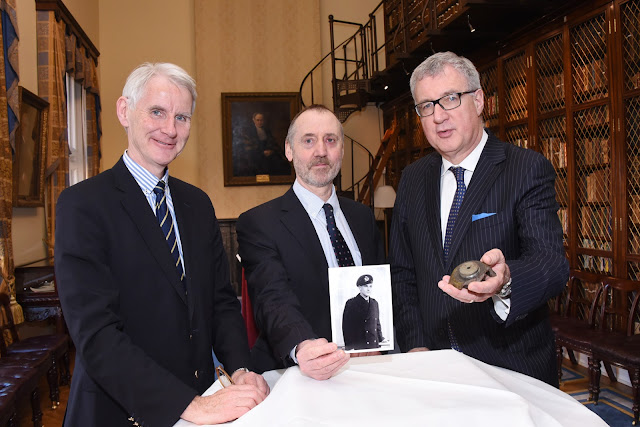A World War II bomb which led to the birth of chemotherapy
Yesterday, Senator John Crown, Consultant
Oncologist at St Vincent’s Hospital, donated a World War II bomb fragment to
the Heritage Centre. The fragment had been given to him by a former patient,
Dermot ‘Derry’ Clarke, and has a surprising connection to medical innovation.
 Derry Clarke was born in Dublin in 1922. He
was educated by the Christian Brothers, and subsequently went on to study the
new field of electrical engineering in Kevin St College. Despite his father’s request that he seek out
secure work at home in Ireland, Derry enlisted for the British Merchant Navy in
1942 and found himself working in one of the most professions of the time.
Merchant seamen serving in the convoys suffered a horrendous casualty rate of
one in four, seven times higher than that of the Allied armed services.
Derry Clarke was born in Dublin in 1922. He
was educated by the Christian Brothers, and subsequently went on to study the
new field of electrical engineering in Kevin St College. Despite his father’s request that he seek out
secure work at home in Ireland, Derry enlisted for the British Merchant Navy in
1942 and found himself working in one of the most professions of the time.
Merchant seamen serving in the convoys suffered a horrendous casualty rate of
one in four, seven times higher than that of the Allied armed services.
On the night of 2 December 1943, Germany
launched a devastating air attack on the Italian port of Bari, sinking or
damaging 40 ships. One of these, the US ship SS John Harvey, was carrying a secret cargo of mustard gas shells. Derry Clarke was aboard the supply ship, SS
Director which was berthed in Bari Harbour, next to the fated vessel. A last
minute move to a different part of the harbour saved the lives of Derry and his
shipmates as the bombs rained down.
As a result of the attack many military
personnel and civilians suffered from the effects of gas exposure, caused by
the explosion of the mustard gas shells. Lieutenant Colonel Stewart Francis
Alexander was dispatched to Bari and after conducting a series of tests
discovered that the chemicals in the mustard gas killed white blood cells,
prompting Alexander to wonder if chemicals would be useful in killing cancer
cells. Based on his work, two Yale pharmacologists
were hired by the military to study the use of mustard gas chemicals and
developed the first chemotherapy drug, mechlorethamine to treat lymphoma.
 |
| Prof Frank Murray, Mr Kevin Clarke (son of Derry) and Senator John Crown |
“Derry was, during his long life, the Aer
Lingus Director of Operations, an athlete, a merchant seaman, flew in the
airlift which broke the Berlin blockade, a patient of mine, and above all
else, was a gentleman,” said Senator Crown.
“I had heard of the Dr Alexander’s report on
the Bari bombing, it was part of the folklore of an oncology education, so when
Derry told me of his experience I immediately recognised the historical
significance.
“It was amazing for me to reach out and touch
a part of oncological history, really the birth of chemotherapy. To have the
story told by so charming a man as Derry was a privilege.
“A thousand civilians died on that night in
1943 because of the mustard gas that the Allies had shipped to Italy. With
Derry’s passing, their story became a little more obscure. I hope that with
this donation, both the memory of Derry, and the people who did not survive the
Bari bombing, will be honoured and remembered.
“The fragment is a representation of
something good arising from evil, as the mustard gas chemicals eventually lead
to the first chemotherapy drug for the treatment of cancer.
Prof Frank Murray, President of the Royal College of Physicians of Ireland said the donation of the bomb fragment is a very welcome and important addition to the RCPI Heritage Centre.
“The RCPI Heritage Centre is an integral part
of our history and we are delighted to receive this donation.
“Derry Clarke was a participant in one of the
biggest naval bombings of WWII, out of which arose the beginnings of cancer
chemotherapy. His family has been very generous and the College appreciates and
recognizes this.”